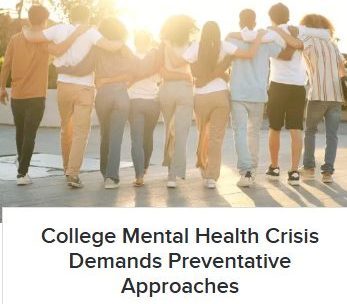In the News
In the News
College Mental Health Crisis Demands Preventative Approaches
Recent headlines paint a sobering picture of campus life across America. Record-high rates of student anxiety and depression, and the growing recognition that campus counseling centers are overwhelmed with month-long waitlists, point to an undeniable reality: our approach to college student mental health needs fundamental rethinking.
As universities struggle to meet surging demand for mental health services—with some institutions reporting 40% increases in service requests since the pandemic—we need a more comprehensive approach. While quality clinical care remains essential, we must expand our focus to include building resilience skills that prepare students to handle challenges before they become overwhelming.
This isn’t an abstract policy concern for me. As a mother of three young adults—two currently in college—I’ve witnessed how today’s campus environment creates unprecedented pressures. My children and their peers navigate not only traditional academic stresses but also heightened social media scrutiny, political polarization, economic uncertainty, campus unrest, and for some, including Jewish students, rising discrimination.
From Crisis to Prevention
The pandemic exposed fundamental gaps in our mental health infrastructure. When COVID-19 hit, healthcare providers found themselves working under traumatic conditions without adequate psychological support. The Ruderman Family Foundation responded by partnering with Dr. Daphne J. Holt of Massachusetts General Hospital to develop resilience training for frontline workers.
What we learned has broader implications: the same resilience skills that helped healthcare workers can benefit students facing their own set of stressors. This realization comes as recent statistics show nearly 60% of college students reporting significant anxiety and 40% experiencing depression severe enough to impair functioning—yet less than one-third seek help.
Dr. Holt’s Resilience and Prevention Program (RAPP) addresses this gap by teaching practical skills that help students manage stress before it escalates to crisis. The program uses evidence-based approaches to build self-awareness, emotional regulation, and stress management capabilities—precisely the skills that recent research identifies as protective factors against severe mental health outcomes.
The Power of Connection
Individual resilience is crucial, but it’s only half the equation. As I’ve watched my own children navigate college life, I’ve seen how isolation can magnify problems while meaningful connections can provide essential support during difficult times.
The pandemic forced students into physical and emotional isolation—a separation that many continue to feel even after returning to campus. What I’ve observed, both personally and through our foundation’s work, is that students thrive when they belong to supportive communities. These communities take many forms across campus, from sororities and fraternities to cultural organizations, faith groups, athletic teams, and academic clubs—each offering unique spaces where students can find belonging and mutual support.
When young people gather in supportive groups, they discover they’re not alone in their struggles. These connections naturally reduce feelings of anxiety and depression. They create spaces where students can share experiences without judgment and learn from peers who understand their challenges firsthand.
While clinical services remain essential and deserve robust funding, wellness and community-building programs often don’t receive the attention or resources they need. These non-clinical approaches can be powerful complements to traditional mental health services. The healing power of human connection deserves greater recognition in our campus wellness strategies.
This need for community is especially urgent given the current climate on campuses. With the Anti-Defamation League reporting an all-time high number of antisemitic incidents on college campuses last year alone, with an alarming 73% of Jewish students experiencing or witnessing antisemitism, targeted students need both personal coping skills and the protective embrace of supportive communities.
Systemic Solutions
With counseling centers overwhelmed nationwide, the most pragmatic response involves equipping the broader campus ecosystem with mental health knowledge. The American Council on Education reported that 70% of college presidents identify mental health as their top concern, yet only 35% of institutions have comprehensive mental health strategies that include prevention.
Our work through the RAPP now focuses on a “train the trainer” model that builds sustainable capacity within campus communities. The approach emphasizes the importance of creating multiple safety nets beyond clinical services. This model provides campus professionals with evidence-based curricula and resources, allowing limited funding to reach far more students than direct service models alone.
What’s Actually Working
The mental health challenges facing today’s students demand solutions that match the scale of the problem. Emerging research shows that comprehensive approaches combining clinical services, peer support, and resilience training consistently produce the strongest outcomes for student wellbeing.
The most effective models across higher education share key elements: they normalize help-seeking behavior without stigma, provide accessible support before crisis points, and build resilience skills that serve students throughout their lives. Most importantly, they acknowledge that student mental health isn’t just a counseling center issue—it’s a campus-wide responsibility requiring multifaceted responses.
This is precisely why programs like RAPP are so promising. By combining evidence-based resilience training with a sustainable “train the trainer” approach, RAPP provides students with practical tools that benefit them not just during crisis moments, but throughout their academic careers and beyond.
As both campus administrators and policymakers grapple with the ongoing mental health crisis, the evidence increasingly points toward prevention as a critical component of any sustainable solution. By investing in resilience programs that equip students, faculty, and staff with the skills to manage stress effectively, we can help ensure that today’s headlines about campus mental health crises don’t become tomorrow’s reality for the next generation of students.
Stay Included
To stay up to date on our most recent advocacy efforts, events and exciting developments, subscribe to our newsletter and blog!
















